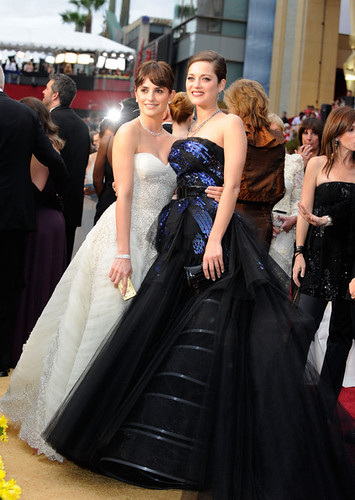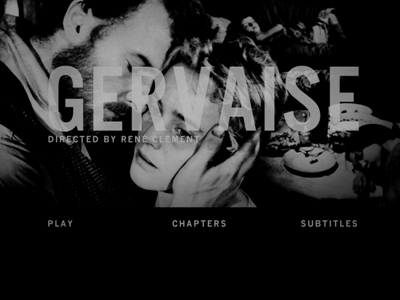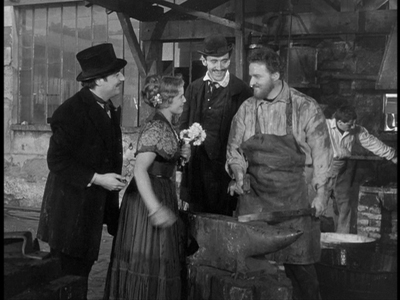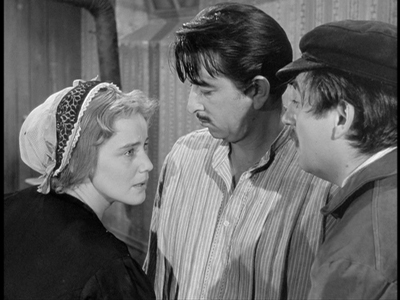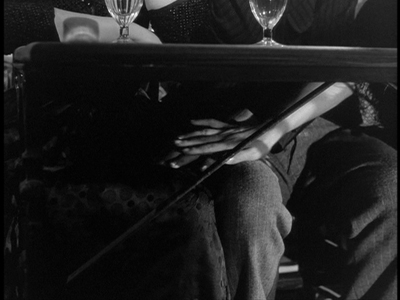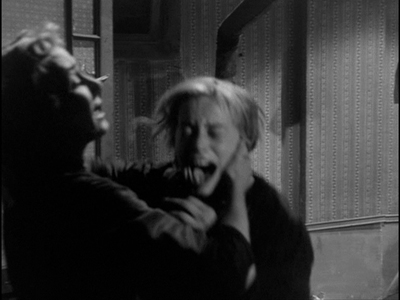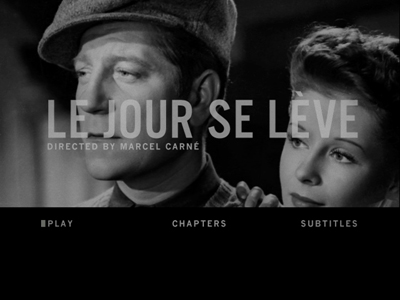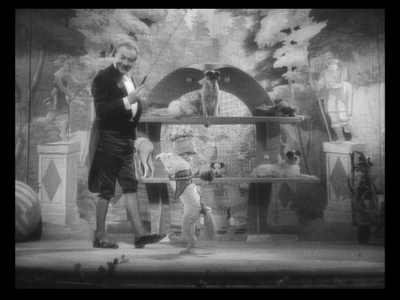"
I really have nothing to say, but I want to say it all the same."

Several years ago, I blogged about
how I didn't believe in writer's block. Don't let that there are only three comments on the entry fool you, it was one of my more "controversial" topics. I got plenty of e-mails about it, had it brought up fairly regularly at work-related social gatherings, I had a lot of professional writer friends who either agreed or disagreed and wanted to hash out what separated us and what linked us. I stand by that lack of belief still. I may get stuck, I may have bad days, but "writer's block" is still not a real condition.
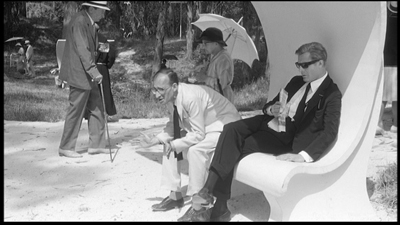
Upon once again watching Fellini's 1963 masterpiece of troubled creation,
8 1/2, it occurred to me that one of the big problems with
Nine [
full review], the newly filmed musical adaptation of this unadaptable classic, is how much the writers of that travesty missed the point of Guido Anslemi's ailment. He is not blocked, not even remotely, his problem is an overabundance of ideas and a lack of clarity.
Nine reduces his artistic plight to comedic business: he can't write, refuses to write, lies about writing. Then again, the entire production of
Nine is one of simple-mindedness. The play makes it all about Guido's frayed libido and offers a solution of monogamous fidelity. In
8 1/2, one female muse does show Guido the way, but the true lesson is he needs all of them. The wife, the mistress, the fantasy. He needs everyone, male and female, to get his work done.
The great Marcello Mastroianni stars in
8 1/2 as Guido, the successful film director whose career is heading toward the skids. He's hiding out in a health spa, drying out via a combination of medicine and Catholicism. He is working on his new screenplay with a caustic writer named Daumier (Jean Rougeul), who keeps telling him that his script is incomplete due to a lack of a point, not for want of story. In fact, Guido has too much story. It's everywhere around him. It appears to him in dreams, as visions and reenactments of memory, creeping into his every living moment. Fellini has dismantled the wall between reality and imagination, leaving us to decide where to apply the definition of each. In truth, of course, it's all imagination, this is a flickering fiction we are watching, and the curtain will drop at the end, Guido conducting his cast the way Fellini is off screen conducting his.


Guido's life has become one of never-ending spectacle. A famous figure whose films are known for their "soullessness," he is followed by religious figures, studio busybodies, actresses and their flunkies--all of them part of some spectacle or other, none of them any more substantial than their accusations. Throughout
8 1/2, more and more people gather around Guido. His producer, crewmen, and, of course, his wife and mistress. The mistress is a flashy married woman named Carla, played by the gorgeous and sexy Sandra Milo, a silly creature who is playful with her lover even as she is selfish and demanding. By contrast, Luisa Anselmi (Anouk Aimee), in her glasses and plain white shirt, is serious and demands very little. Her biggest request? Don't lie to her. Unfortunately, lies are Guido's stock in trade. His new epic, despite the fact that it has a spaceship as its central set piece, is really a rehashing of his biography. From the memories of his childhood, of his mother and father and the mentally unstable whore Saraghina (Edra Gale) who dances a rumba for a young Guido and his chums, all the way through his interactions with Carla and how he hides his infidelity from Luisa, these things are the spine of his script. A painful run-through of screen tests, showing an endless parade of interchangeable actresses going through the motions of each part, reveals how stuck in his own mess Guido is.
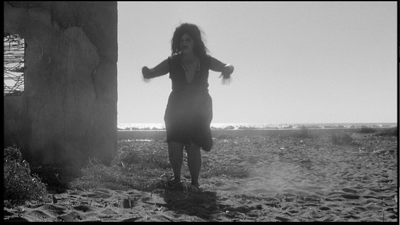
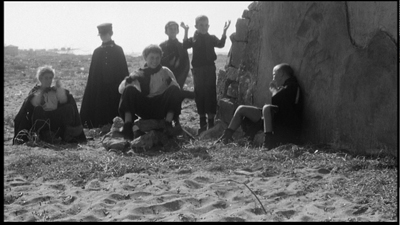
The director is the architect of his own fate. Success is his albatross. He is trapped by expectations--those of the press, the businessmen, the clergy, and even his own. What does he have to say that he hasn't said before? Is the reason that he can't make a movie about love because he doesn't know how to experience true love in his own life? That's what his actress tells him. Most of the film is spent waiting for Claudia, played by the divine Claudia Cardinale, to arrive. She appears as visions prior to her really showing up, and she is the simple idea that Guido is waiting for. Just before she lands, he has his most elaborate vision, in which all the women of his life are part of an extended harem that he is trying to maintain control of. It's within this dream that it becomes clear that it's all gotten too complicated for him. It's like Hemingway implored, that each writer must struggle to write that "one true sentence." Claudia is that true sentence, and she is also the truth teller. She sees right through the filmmaker's pretense.

The wonderful thing about Federico Fellini is how effortlessly he blends his reality into the fabric of show business. Channeling his own anxieties about maintaining creative success into
8 1/2 could have been an exercise in precious self-indulgence, but it's really just another day at the office for a director whose lifelong passion was the sparkle and glitz of performance. Much in the same way
Bergman was drawn to the façade of entertainers and what it revealed about the human condition, Fellini works to bolster the illusion as if it were the true mirror rather than a distorted reflection. He and cinematographer Gianni di Venanzo create a stunning black-and-white world full of open spaces, isolating Guido within his spacious mindscapes, while also working with art director Piero Gheradi in creating a monument to the complexity of his fantasies with the towering launchpad for his cinematic spaceship (an excellent metaphor that--filmmakers are all astronauts, the movie set their point of take-off).
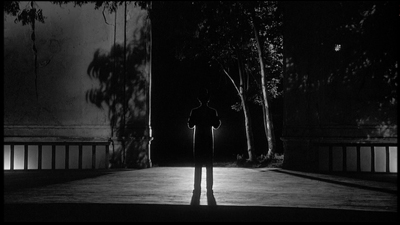
Sound is also important, perhaps just as important as the look of the movie. The music of Nino Rota creates surreal audioscapes; the score for the dream where Guido sees his parents reminded me of desolate
Twilight Zone episodes like
"The Lonely" (the one where Jack Warden is a convict living with a robot on an isolated asteroid). The sound designers, Mario Faraoni and Alberto Bartolomei, also add telling effects to different scenes. Listen to that sucking noise Guido hears when he gets on the elevator with the priests. It's like they are drawing him down into death itself, like a fading patient hooked up to a ventilator in a hospital somewhere.
Marcello Mastroianni is one of cinema's great charmers, basically Italy's answer to Cary Grant or George Clooney. His charisma refuses to be buried, and so
8 1/2 avoids becoming dour. He's a scoundrel, always checking out the ladies, humorlessly unapologetic when caught in the act. When Carla and Luisa collide, Guido goes into performance mode, adding another layer to the acting. Mastroianni is playing the part of a cad playing his part. Yet, when Claudia comes along, he is also capable of being vulnerable. The veneer is torn asunder, and the exposure leaves him hanging out there in the big climax. His producers have scheduled a huge press conference/cocktail party out at the launchpad set, and Guido has nowhere to hide. There are so many questions and accusations being tossed at him out there, I almost didn't notice that the producer suggests that Guido has been hiding out for three days, trying to avoid this public appearance. Is it possible that we are meant to imagine Guido as a kind of Christ-like figure, dead for three days and now rising again? His floating away at the start of the picture is even reminiscent of the opening of
La Dolce Vita
.
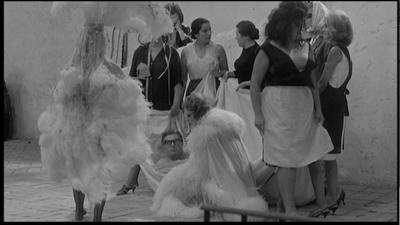
If so, the order is a little backwards, because this party is Guido's crucifixion, and depending on how literally you want to take it, possibly his suicide. (And you know, given that Christ sacrificed himself willingly, this is also not off the mark.) The difference here is that no one expects Guido to come back. Not even Guido. In that, though, is his own salvation. The pressure is off, and the disparate pieces of the story he has been chewing on come together. He needed to give himself permission to stop worrying about expectations, stop worrying about how much exposure he was giving the truth, and just go with it. How cathartic that must have been for Fellini, too, getting to that point in the script and granting himself the same privilege as his character. Like the conga line of the dead at the end of
The Seventh Seal, Guido's cast dances off into the sunset, which is a pretty accurate representation of what it's like to finish writing something.
In fact, I may do a little dance right now. Because I'm done, too.


Though I reviewed this watching the original release bought for my collection in 2001, you should know that Criterion just released a Blu-Ray version. Here is a review of it by DVD Talk's Adam Tyner.
